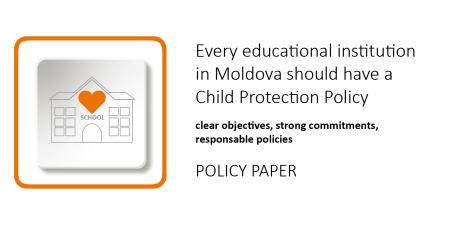According to the Survey on Violence against Children (VACS, 2019), 2 out of 5 girls (36.8%) and boys (37.8%) were subjected to some type of violence. 1 in 7 girls (14.4%) and 1 in 20 boys (5.3%) were subjected to sexual violence until the age of 18. According to the data from the national study, Child Safety on the Internet (2017), every 6th child aged 13–15 years (16.2%) received offensive messages via Messenger, Viber, and other social networks.
According to global data, Moldova has one of the highest rates of peer violence in the region, occupying the 3rd position after Lithuania and Latvia: 57% of children aged 13–15 participated in at least one fight in the last year and / or say that they have been harassed at least once in the last few months.
According to the latest MECC report, between September and December 2019, education employees identified 4,738 suspected cases of physical and/or emotional abuse, neglect, labour exploitation, sexual harassment and bullying. Annually, between 1600 and 1700 suspected cases of violence against children are reported by educational institutions to the child protection authorities.
The commitments of the national authorities to ensure a protective environment for children are found in the Education Code of the Republic of Moldova (approved by the Parliament in 2014), and in the Education Development Strategy for 2014–2020 (approved in 2014), which expressly provides for 'the development and implementation of child protection policies at all levels, taking into account the rights of the child, the child's developing abilities and local needs'. Also, several departmental papers and methodological guides have been approved by the Ministry of Education, Culture and Research, in order to implement national policies in the field of child protection, including the implementation guide, Child Protection Policy in the Educational Institution.
Considering that in the last year of implementation of the Strategy 'Education–2020', about 38% of educational institutions do not have a Child Protection Policy (see the study Bullying in the Republic of Moldova, MECC, UNICEF, 2019), and many of the institutions that have adopted the policy do not apply it, APSCF believes that new measures are required to support and encourage the application of a Child Protection Policy in all educational institutions, including those in early education and vocational schools.
RECOMMENDATIONS
- Promoting a positive and safe school environment by increasing the capacities of educational institutions in participatory development and implementation of Institutional Child Protection Policies;
- Analysis of the situation regarding the elaboration and implementation of the Child Protection Policies in the early education, primary, secondary, high school, technical professional, special and extracurricular institutions in the country;
- Promoting best practices in implementing the Child Protection Policy and facilitating the exchange of experience between educational institutions;
- Ensuring teachers' access to information, resources and support materials, creating a system of supervision and support for school staff in order to respond effectively to school violence and bullying.
- Reviewing the training curricula for teachers, developing the necessary skills for the recognition, prevention and reporting the cases of violence against children and bullying.
- Constant monitoring of the institutions' response to prevent and combat VNET by implementing the Child Protection Policies;
- Promoting non-violent approaches to discipline and classroom management, non-discriminatory and sensitive attitudes from the point of view of children's rights.
SEE THE POLICY PAPER HERE (Romanian language).
The Alliance of Active NGOs in the field of Child and Family Social Protection (APSCF) is a network of 55 non-governmental organizations throughout the Republic of Moldova, including the Transnistrian region. APSCF is working to create a coherent and functional development framework of the decision makers and of the implementation mechanisms and practices, while ensuring the respect and real protection of children and families.
- Accedi o registrati per poter commentare
- 276 viste






